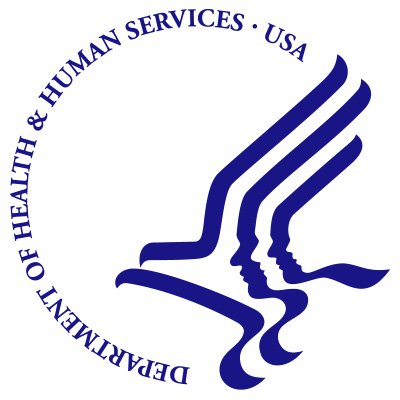Healthcare Employee: Your Right to Vaccine Exemption

Hundreds of healthcare workers requested information about the discrimination they are facing in the workplace due to mandated vaccinations. These individuals are being terminated from employment over a medical procedure that violates their conscience or moral belief.
The very unfortunate reality is that our health freedoms are under attack in our country. The choice to be vaccinated or not as an adult should be a private decision, but now our vaccination status has become a condition for employment at many hospitals.
Those who fight for a religious or medical exemption are often denied due to strict interpretations by hospital policy administrators. The assistance of a vaccine lawyer is often required to successfully utilize exemptions that hospital policies will allow. Placing dedicated hospital employees in the difficult position as of either submitting to a dangerous medical procedure or face being fired is unethical and unfair.
While the federal government cannot restrict or enforce vaccine mandates they can protect individuals facing discrimination by their employers.
In January 2018, the current administration established division of the Department of Health and Human Services (HHS) that was designed “to restore federal enforcement of our nation’s laws that protect the fundamental and unalienable rights of conscience and religious freedom” and specifically provides oversight to those organizations that receive federal funding. This new department is called the “The Conscience and Religious Freedom Division” Reference: https://www.hhs.gov/conscience/conscience-protections/index.html
“Conscience protections apply to health care providers who refuse to perform, accommodate, or assist with certain health care services on religious or moral grounds.”
In addition, the Federal Government offers protection from religious discrimination to employees under the Equal Employment Opportunity Commission (EEOC).
In an effort to support our healthcare employees, Health Freedom Idaho hosted an educational seminar with attorneys Alan Phillips J.D. and Colton Boyles to help support the healthcare community by providing information about civil rights and the process to file complaints with the proper authorities when those rights are violated.
Three Steps to Preserving Your Civil Rights
1. START – With Hospital/Administration Policy Makers
There are steps you need to take prior to termination in order to protect yourself. Start by submitting an attorney drafted letter requesting religious accommodation for vaccine exemption and providing the hospital/entity with information regarding their civil rights violations. It is easier to attempt to change your hospital/employers internal policy towards protecting the civil rights of employees and ultimately affecting you and your co-workers in a positive manner.
2. NEXT – File With the New HHS Department
- File a complaint with HHS here (answer the screener questions) once completed the process continues at the U.S. Department of Health and Human Services Civil Rights Complaint Portal.
What is the consequence to the employer who participates in moral/religious discrimination?
An entity receiving federal funding through HHS has the potential of losing the federal funding if they violate an individual’s right for religious or moral conscience. This could be an opening to ensure that all vaccine coercion at a state level is stopped from a federal level. Alan Phillips J.D. said that it appears that the rules updated November 2018 do NOT EXCLUDE vaccinations.
Christiana Hilderbrand of a Voice for Choice Advocacy shared earlier this year that the new Conscience and Religious Department of the HHS might afford an opportunity for employees to be heard on matters of religious discrimination from ‘immunization policies’ in the workplace for those organizations/employers receiving HHS funding. (See her video here).
Kent Heckenlively, JD commented on the new HHS Department with encouraging words:
“The lawyer in me recognizes expansive legal language and my little litigator’s heart rejoices with the arguments I can spin from it.” 2
How can you know if your employer is receiving federal funds?
There are very few organizations that do NOT receive federal funding from of one of the numerous programs offered by HHS.
Has your conscience or religious freedom been violated?
Complaints filed earlier this year are currently being reviewed. It is critical for those who have experienced discrimination to file a complaint.
HHS Office for Civil Rights, Director Roger Severino said,
“Law protecting religious freedom and conscience rights are just empty words on paper if they aren’t enforced. No one should be forced to choose between helping sick people and living by one’s deepest moral or religious convictions, and the new division will help guarantee that victims of unlawful discrimination find justice. For too long, governments big and small have treated conscience claims with hostility instead of protection, but change is coming and it begins here and now.”
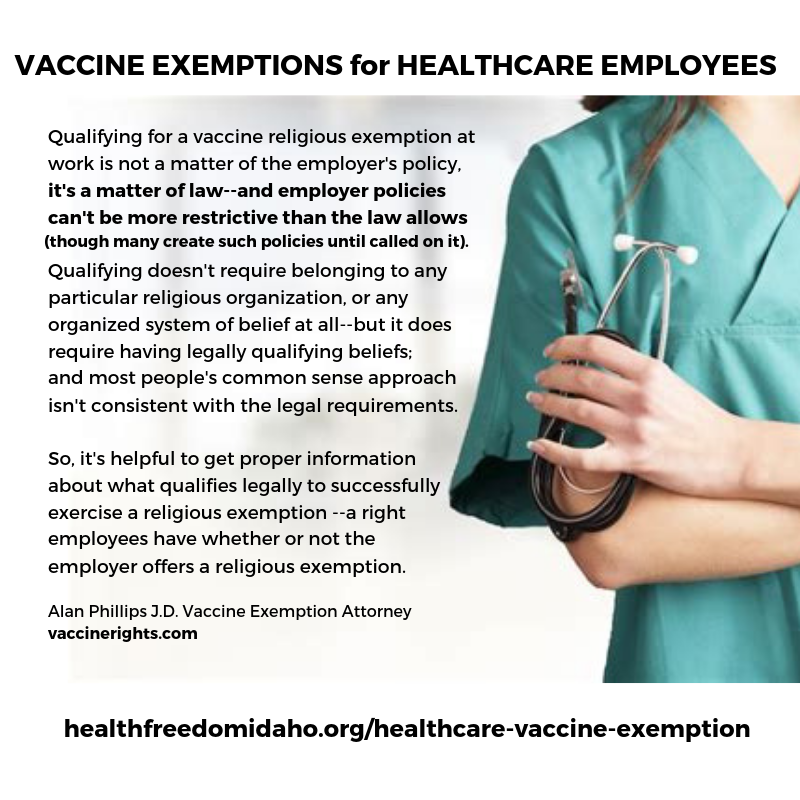
How do I file a complaint?
The process is rather straightforward. Gather specific information, names, dates about the situation and fill out the online form.
- File a complaint with HHS here (answer the screener questions). See also the U.S. Department of Health and Human Services
Office for Civil Rights Complaint Portal.
How Long Does The Process Take?
Many have filed complaints, but few have heard a response back. Some individuals have indicated that they received word back that their complaints have been received by the HHS with an investigation pending. To date, no denials have been issued regarding vaccine mandates in the workplace.(Note: Mr. Phillips requested that you share with him directly information on the subject should you receive an approval or denial on your HHS claim contact him at VaccineRights.com Sharing relevant information will help strengthen our stand.)
Is Filing With HHS the Only Course Of Action? No, Says Alan Phillips J.D.
Alan Phillips, the nation’s leading vaccine rights attorney, speaks with authority about vaccine exemptions in the workplace. He started the event reminding us that if you speak out against corruption, you risk being attacked. If you stay silent, it is certain we will all be attacked.
Alan shared his expertise with the audience regarding vaccine exemption discrimination in the workplace.
So How Do We ‘Stand Together’?
Mr. Phillips feels that the HHS may not be the most productive place to file a complaint as an employee. As a new department, it doesn’t seem to follow it’s internal rules and may be inconsistent in how they approach cases. He filed two complaints with the department and hasn’t heard back on either. However he explained further,
“The worst thing that could happen if you file a complaint of employment discrimination with the HHS is you will receive a letter back saying ‘we can’t help you.’
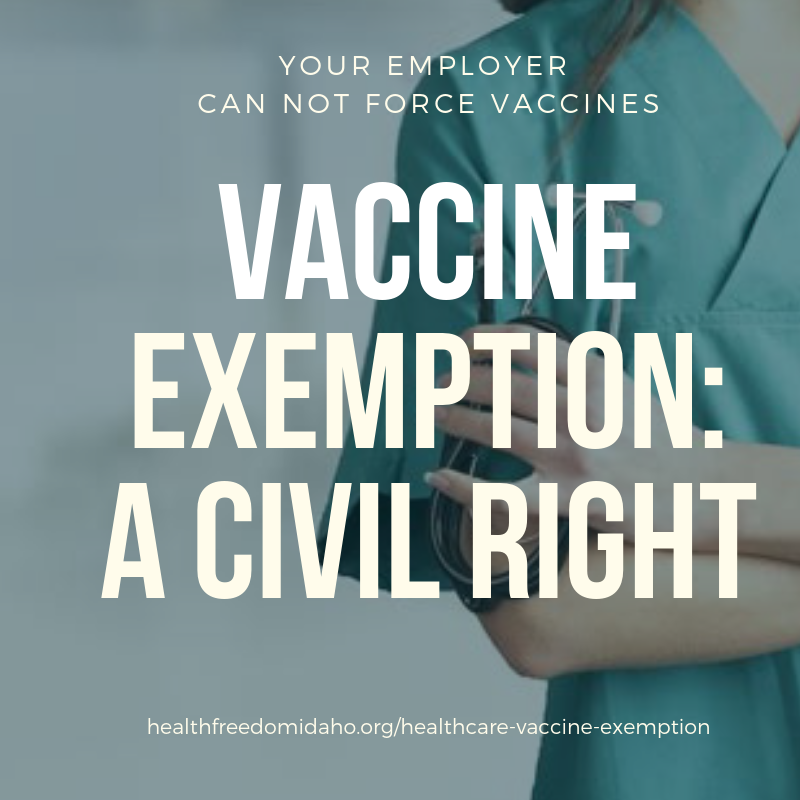
3. File A Complaint With the EEOC: The Best Opportunity To Be Heard
The Federal Department that has long handled discrimination cases is the Equal Employment Opportunity Commission (EEOC).
- To preserve the ability of EEOC to act on your behalf and to protect your right to file a private lawsuit, you should contact EEOC promptly when discrimination is suspected: The U.S. Equal Employment Opportunity Commission (EEOC), 1-800-669-4000 (toll-free) or 1-800-669-6820 (toll-free TTY number for individuals with hearing impairments) or go to www.eeoc.gov.
Colton Boyles, associate with the Davillier Law Group in Sandpoint, Idaho, provided information about religious discrimination in the workplace by reading from the EEOC compliance manual found on their website:
“Title VII of the Civil Rights Act of 1964 prohibits employers from discriminating against individuals because of their religion (or lack of religious belief) in hiring, firing, or any other terms and conditions of employment. The EEOC definition of ‘religion’ typically concerns ultimate ideas about life, purpose, and death.”
A recent case of religious vaccine exemption denial and how the EEOC and DOJ both got involved.

Ms. Williams was terminated from employment at a nursing home that mandated flu shots because her employer refused her request for religious exemption. On October 24, 2016, Williams met with Campus Administrator Ralph Luedtke, the Center’s highest-ranking official, and requested a religious exemption from its mandatory vaccination policy. In their meeting, Williams explained that she had a religious belief stemming from her interpretation of the Bible that prohibited her from putting certain foreign substances, including vaccinations, in her body because it was a “Holy Temple.” Williams told Luedtke that she believed that receiving a vaccination would violate that religious prohibition. Luedtke told Williams that if she did not receive a vaccination she would be terminated. Specifically, Luedtke told Williams that if she did not get the shot, “Consider this your last day.”
Ms. Willliams had provided a letter ci the Bible and from friends and relatives citing the sincerity of her belief. The official refused to accept the letter and Williams submitted to the flu shot in order to maintain her employment. The DOJ concluded that the Center could have reasonably accommodated Williams’ religious objection to receiving the mandatory flu shot. The Center’s refusal to allow Williams to verify the sincerity of her religious exemption request by using something other than a letter from a clergy member was unjustified. In fact, since Williams filed her charge, the Center changed its policy and no longer requires a letter from a clergy leader to obtain a religious exemption to the flu vaccination requirement. The Center is a public, non-religious employer. The requirement that the letter be from a clergy leader was not necessary for the Center’s business purposes and was not related to the Center’s business operations.
FILE A COMPLAINT SOONER RATHER THAN LATER. If you are discriminated against, time is of the essence! You have a window of 180 days.
Mr. Phillips explains that an employer (with 15 or more employees) is under obligation from the Federal Government to adhere to the civil rights act of 1964.
“You request a religious exemption, whether or not your employer offers it. You request it and that triggers their legal obligation to accommodate it. They have to accommodate you unless they can prove it will cause them ‘undue hardship’. What that usually means, it’s going to cost them a lot of money.”
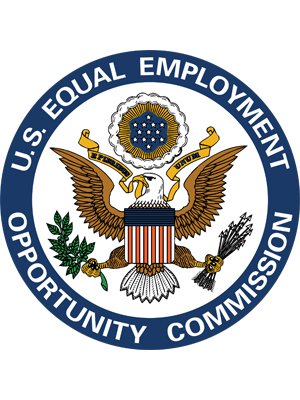
“Title VII requires an employer, once on notice that a religious accommodation is needed, to reasonably accommodate an employee whose sincerely held religious belief, practice, or observance conflicts with a work requirement, unless doing so would pose an undue hardship. Under Title VII, the undue hardship defense to providing religious accommodation requires a showing that the proposed accommodation in a particular case poses a “more than de minimis” cost or burden. Note that this is a lower standard for an employer to meet than undue hardship under the Americans with Disabilities Act (ADA) which is defined in that statute as “significant difficulty or expense.”
Mr. Phillips said that in all the 500 cases he’s been involved in the past seven years, not a single employer has claimed undue hardship due to an exemption of the flu shot by employees.
When an employee requests a religious accommodation, the employer has an obligation to provide that to the employee. Time is of the essence! EEOC Title VII of the Civil Rights Act (Title VII) charges must be filed with EEOC within 180 days of the alleged discriminatory act.
Again, to preserve the ability of EEOC to act on your behalf and to protect your right to file a private lawsuit, you should contact EEOC promptly when discrimination is suspected: The U.S. Equal Employment Opportunity Commission (EEOC), 1-800-669-4000 (toll-free) or 1-800-669-6820 (toll-free TTY number for individuals with hearing impairments).
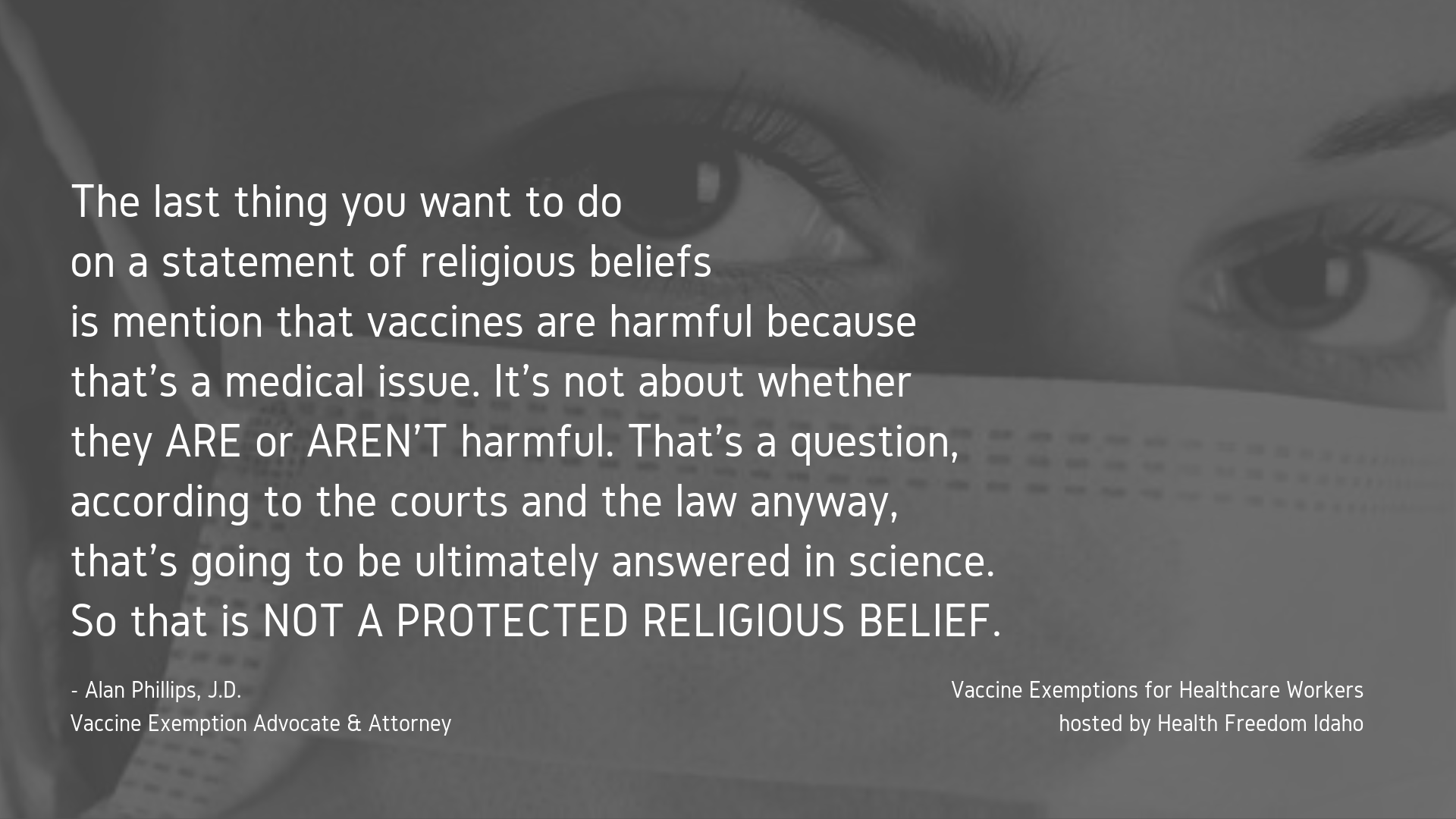
Fortunately for now, the majority of hospitals appear to recognize a Title VII right for their employees to refuse vaccines for religious reasons, and most of the healthcare worker have been successful in refusing vaccines and keeping their jobs without facing the decision of whether or not to sue. As long as you avoid the legal pitfalls and your employer has a religious exemption policy, there’s a good chance of success.
What Is the WORST Thing You Can Do When Filing For a Religious Accommodation?
Mr. Phillips reiterated that the worst thing an employee can do when requesting a religious accommodation is to mention vaccine harm.
The last thing you want to do on a statement of religious beliefs is mention that vaccines are harmful because that’s a medical issue. It’s not about whether they ARE or AREN’T harmful. That’s a question, according to the courts and the law anyway, that’s going to be ultimately answered in science. So that is NOT A PROTECTED RELIGIOUS BELIEF.
Exemption Policies That Violate Civil Rights
- What if my employer has a “religious exemption” but I have to get “clergy support” (e.g. a letter from a minister stating it is against my organized religious beliefs)? That is a blatant violation of civil rights! You do NOT have to be a member of a religious organization.
- Religious Exemptions for the Non-Religious Individual. You don’t have to believe in a western theological deity! In fact, an atheist can have a firmly held belief against the animals use in vaccines and have their vaccine exemption protected under the protection against “religious discrimination.”
WATCH OUT FOR LEGAL PITFALLS!
The definition of “religion” in terms of the law is different than the “common sense” idea of religion. Mr. Phillips warns the viewer, “If you are in a situation in the employment arena where you have to state your beliefs, do your research and hire an attorney to draft your letter that is legally sound.”
You can’t “unsay” statements. Once you put it out there, you are pretty much stuck with it. The safest thing is to consult a knowledgeable attorney in order to protect your right to vaccine exemption so that you can approach this from the start from a legally sound place. That’s going to give you the best chance of succeeding in your goal of exemption.
Alan Phillips reiterates this point on his website vaccinerights.com
“The two best ways to make informed decisions on vaccine exemptions and waivers are to consult an experienced attorney, and/or purchase The Authoritative Guide to Vaccine Legal Exemptions e-book. Beware of Internet advice. Even highly reputable sites, including those of alternative medical doctors and vaccine book authors, provide information about vaccine rights that is usually a mixture of accurate and inaccurate information. Some who have relied on anti-vaccine websites have lost exemption rights unnecessarily. If it doesn’t come from an attorney experienced in this area of the law, beware! “
Attorney Phillips has assisted clients and other attorneys around the country with vaccine exemption and waiver matters. Thank you to the attorneys that participated in our educational seminar. They invite you to contact them with further questions or concerns.
It won’t be easy to stand against corruption. They are starting with the healthcare community but it won’t stop there. Mr. Phillips reminds us that if enough of us stand together, the tide can be stopped.
References:
1 More Information from Christina Hilderbrand on the HHS Complaint https://healthfreedomidaho.com/complaint
Court Cases:
United States vs OZAUKEE COUNTY, WISCONSIN, Case 2:18-cv-00343-DEJ Filed 03/06/18 https://www.laborandemploymentlawcounsel.com/wp-content/uploads/sites/224/2018/03/US-v-Ozaukee-Cty-No18-cv-00343-ED-Wis-COMPLAINT-3-6-18.pdf
NORTH CAROLINA NEWS – MISSION HOSPITAL AGREES TO PAY $89,000 TO SETTLE EEOC RELIGIOUS DISCRIMINATION LAWSUIT
CASE: https://www.stl.news/wp-content/uploads/2018/01/EEOC-v-Mission-Hospital-Complaint.pdf
EEOC Religious Discrimination in the Workplace

